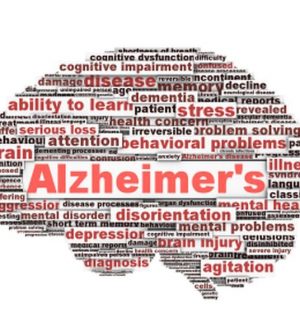- Could Your Grocery Store Meat Be Causing Recurring UTIs?
- Are You Making This Expensive Thermostat Error This Winter?
- Recognizing the Signs of Hypothyroidism
- 10 Strategies to Overcome Insomnia
- Could Artificial Sweeteners Be Aging the Brain Faster?
- Techniques for Soothing Your Nervous System
- Does the Water in Your House Smell Funny? Here’s Why
- Can a Daily Dose of Apple Cider Vinegar Actually Aid Weight Loss?
- 6 Health Beverages That Can Actually Spike Your Blood Sugar
- Treatment Options for Social Anxiety Disorder
Millions Could Miss Out on a Potential Alzheimer’s Breakthrough

Even if researchers were to find a groundbreaking new treatment for Alzheimer’s disease, millions of people might not benefit from it, new research reveals.
That’s because the U.S. health care system doesn’t have the ability to quickly implement a newly approved treatment on a widespread scale, according to a report from the RAND Corporation.
For instance, there aren’t enough doctors to diagnose all the people with early signs of dementia who would be good candidates for such a treatment, the researchers explained. In addition, scanners used to detect the disease are in short supply, and there aren’t enough treatment centers that could administer the therapy to patients.
An estimated 5.5 million Americans are currently living with Alzheimer’s disease. By 2040, that number is expected to jump to 11.6 million, according to the study authors.
“While significant effort is being put into developing treatments to slow or block the progression of Alzheimer’s dementia, little work has been done to get the medical system ready for such an advancement,” said study lead author Jodi Liu. She is a policy researcher at RAND, a nonprofit research group.
“While there is no certainty an Alzheimer’s therapy will be approved soon, our work suggests that health care leaders should begin thinking about how to respond to such a breakthrough,” Liu explained in a RAND news release.
At least 10 therapies currently undergoing clinical trials are considered promising, according to the study authors. RAND researchers believe enough progress has been made to suggest that a possible treatment to slow the effects of the disease may be available within a few years.
For the study, Liu and her colleagues analyzed how patients would be able to receive a newly approved therapy and how such a treatment advance would affect the U.S. health care system.
For instance, if a new therapy were approved for use as of 2020 and screening began in 2019, about 71 million Americans aged 55 and older would need to be screened for mild cognitive impairment, the researchers said. Follow-up exams and imaging tests also would be needed to confirm an Alzheimer’s diagnosis. The study authors estimated that 2.4 million people would be recommended for the new treatment.
Based on those calculations, the demand for the new treatment would exceed the U.S. health care system’s available resources. That would result in waits of more than 18 months for each phase of diagnosis and treatment — a wait that wouldn’t drop to closer to one month until 2030, the study authors projected.
To be better prepared for approval of an Alzheimer’s treatment, the researchers recommended:
- Primary care doctors and nurse practitioners should be trained to conduct initial screening for mild cognitive impairment, to help offset the expected shortage of dementia specialists. Primary care doctors could also become certified in dementia care so they could help test and treat the disease.
- Researchers should focus on efforts to develop alternatives for PET scans, currently the only FDA-approved test to diagnose brain changes associated with Alzheimer’s disease.
- Treatment centers should increase their capacity for giving injections and IV infusions because most treatments now being tested involve biologic drugs given by injection or infusion. Also, health care officials should consider allowing treatments in doctors’ offices and private homes to lower costs.
According to study senior author Dr. Soeren Mattke, “Addressing the capacity constraints may turn out to be as challenging as developing an effective treatment for Alzheimer’s.”
But, he added, “it is important to begin the discussion among stakeholders about how to start addressing the obstacles in a timely manner.”
Mattke is the managing director of RAND Health Advisory Services.
More information
The U.S. National Institute on Aging has more about Alzheimer’s disease.
Source: HealthDay
Copyright © 2026 HealthDay. All rights reserved.










